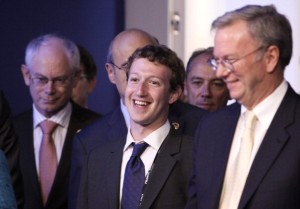By Glenn Greenwald21 Aug 2014, 5:02 PM EDT
DEAUVILLE, FRANCE – MAY 26: (L-R) Herman Van Rompuy, president of the European Union, Mark Zuckerberg, founder of Facebook Inc. and Eric Schmidt, chairman of Google Inc. arrive for the internet session of the G8 summit on May 26, 2011 in Deauville, France. (Photo by Chris Ratcliffe – Pool/Getty Images)
There have been increasingly vocal calls for Twitter, Facebook and other Silicon Valley corporations to more aggressively police what their users are permitted to see and read. Last month in The Washington Post, for instance, MSNBC host Ronan Farrow demanded that social media companies ban the accounts of “terrorists” who issue “direct calls” for violence.
This week, the announcement by Twitter CEO Dick Costolo that the company would prohibit the posting of the James Foley beheading video and photos from it (and suspend the accounts of anyone who links to the video) met with overwhelming approval. What made that so significant, as The Guardian‘s James Ball noted today, was that “Twitter has promoted its free speech credentials aggressively since the network’s inception.” By contrast, Facebook has long actively regulated what its users are permitted to say and read; at the end of 2013, the company reversed its prior ruling and decided that posting of beheading videos would be allowed, but only if the user did not express support for the act.
Given the savagery of the Foley video, it’s easy in isolation to cheer for its banning on Twitter. But that’s always how censorship functions: it invariably starts with the suppression of viewpoints which are so widely hated that the emotional response they produce drowns out any consideration of the principle being endorsed.
It’s tempting to support criminalization of, say, racist views as long as one focuses on one’s contempt for those views and ignores the serious dangers of vesting the state with the general power to create lists of prohibited ideas. That’s why free speech defenders such as the ACLU so often represent and defend racists and others with heinous views in free speech cases: because that’s where free speech erosions become legitimized in the first instance when endorsed or acquiesced to.
The question posed by Twitter’s announcement is not whether you think it’s a good idea for people to see the Foley video. Instead, the relevant question is whether you want Twitter, Facebook and Google executives exercising vast power over what can be seen and read.
For detail please visit here

